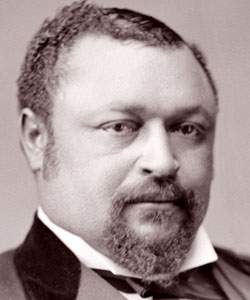Blanche Kelso Bruce (Congressional Biographical Directory)
Reference
BRUCE, Blanche Kelso, a Senator from Mississippi; born in slavery near Farmville, Prince Edward County, Va., March 1, 1841; was tutored by his master’s son; left his master at the beginning of the Civil War; taught school in Hannibal, Mo.; after the war became a planter in Mississippi; member of the Mississippi Levee Board; sheriff and tax collector of Bolivar County 1872-1875; elected as a Republican to the United States Senate and served from March 4, 1875, to March 3, 1881; was the first African American to serve a full term in the United States Senate; appointed Register of the Treasury by President James Garfield 1881; recorder of deeds for the District of Columbia 1891-1893; again Register of the Treasury from 1897 until his death in Washington, D.C., on March 17, 1898; interment in Woodlawn Cemetery.
"Bruce, Blanche Kelso," Biographical Directory of the United States Congress, 1774 to Present, http://bioguide.congress.gov/scripts/biodisplay.pl?index=b000968.
Blanche Kelso Bruce (American National Biography)
Scholarship
In March 1875 Bruce took his seat in the Senate, becoming the nation's second black senator and the first black to be elected to a full term. In the Senate he served on four committees, including the important select committees on Mississippi River improvements and on the Freedmen's Bank. As chairman of the latter committee, he led the effort to reform the management of the institution and provide relief for depositors. But a Bruce-sponsored Senate bill to obtain congressional reimbursement for black victims of the bank's failure did not pass. He also spoke out against a Chinese exclusion bill and for a more humane Indian policy. Bruce took these positions, primarily because of the harsh implications that such racist, exclusionist policy had for blacks.
Bruce's main interest in the Senate was the defense of black rights in the South when state and local Republican governments were replaced by hostile conservative ones. Although he was usually unobtrusive in attempting to persuade Congress, and specifically its Republican members, to enforce the Reconstruction amendments to the Constitution, he became passionate in denouncing the violence and intimidation that characterized the Mississippi election of 1875 overthrowing Republican rule.
Bruce's main interest in the Senate was the defense of black rights in the South when state and local Republican governments were replaced by hostile conservative ones. Although he was usually unobtrusive in attempting to persuade Congress, and specifically its Republican members, to enforce the Reconstruction amendments to the Constitution, he became passionate in denouncing the violence and intimidation that characterized the Mississippi election of 1875 overthrowing Republican rule.
William C. Harris, "Bruce, Blanche Kelso," American National Biography Online, February 2000, http://www.anb.org/articles/04/04-00166.html.



